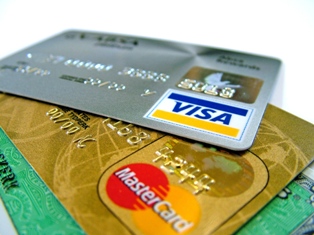Credit Card Debt Exceeds Savings for an Increasing Number of Americans
It looks like 2013 may be the year the U.S. economy finally regains some strength. Unfortunately, the same probably can't be said for consumer finances.

Nearly one quarter of Americans have credit card debts that exceed their savings, according to new data from Bankrate.com. Just 55 percent of those surveyed had more savings than debt.
Those numbers haven't changed much from similar surveys taken in 2011 and 2012, despite recent economic improvements.
Part of the problem is that, over the last several years, wages have been stagnant while prices have increased. With less money in their pockets, American consumers turned to plastic.
Many borrowers began taking on credit card debt to help stretch their paychecks. Others already had large credit card debts that they had been paying off, but were forced to start making minimum payments - or worse, defaulting on payments - during the recession.
When you're only paying the minimum, most or all of your money is going to interest. That means your balance is going unpaid month after month - and, if you're continuing to use your credit card, it's actually growing.
Let's say you're carrying $10,000 in credit card debt and your minimum monthly payment is 2 percent. You could theoretically pay $200 a month for 30 years (that's more than $70,000!) and still not pay off your debt in its entirety.
Our nation's current credit card debt dilemma may have been born in tough economic times, but it probably won't die with them. Economic experts predict that when the economic outlook improves, spending - not saving - will increase.
The truth is, people are tired of carrying debts. Maybe that's why, despite recent economic improvements, consumers are only growing more stressed about money.
Around 40 percent of people surveyed admitted feeling less comfortable about their savings level than a year ago. Roughly half said their feelings haven't changed. Just 14 percent reported feeling more confident about money this year.
For many borrowers, it's a Catch-22: we can't pay down debt until we save up some more money, but we can't save up money until we pay off some of our credit card debt.
When your debt seems like a puzzle that can't be cracked, there may be only one realistic solution: bankruptcy. By filing for bankruptcy, it's possible to reduce or eliminate credit card debt entirely, allowing you to lower bills, get current on mortgage payments, improve your credit and actually start saving money.
Overwhelming debt can keep you in the financial dark despite a brightening economy. But with the right bankruptcy plan, you can get your finances back on track - no matter what the market is doing.
Our experienced bankruptcy attorneys have helped thousands of indebted consumers regain control over their financial lives. To find out what bankruptcy can do for you, call DebtStoppers at 800-440-7235.
Contact us today to schedule your complimentary personal debt analysis with an expert bankruptcy lawyer in Chicago, Atlanta or Tennessee.
More Blog Entries:
Large Debts and Bad Credit Preventing More Americans from Buying Homes: February 13, 2013
Crushing Credit Card Debt Causing More Workers to Postpone Retirement: February 21, 2013
Additional Resources:
1 in 4 Americans Have More Credit Card Debt Than Savings, by Allison Linn, Today

